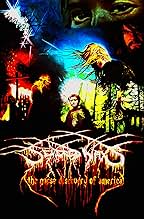As I was saying just the other day, you simply don't see enough good, old-fashioned Viking dramas these days, do you? Then, lo and behold, what should appear but "Severed Ways: The Norse Discovery of America" to help fill the void and make us all wiser as to just how brutal and savage life could be at the turn of the last millennium (the movie is set in 1007 A.D.). However, let it be noted for the action fans in the audience that "Severed Ways" is, if anything, an "art" Nordic drama, a documentary-style, largely wordless cross between "Quest for Fire" and "The New World" - with even a bit of "The Blair Witch Project" thrown in for good measure (the palsied camera-work is what reminds us most of that film).
Orn and Volnard (don't ask me which is which) are two young Norsemen who have embarked on an expedition to North America with other members of their tribe. When their compatriots are killed in a battle with some natives called Skraelings, the two strapping lads flee to the forest where they hide out, search for food, build a makeshift shelter and fight off packs of ravenous animals. They also encounter a couple of Christian monks and more of those dreaded Skraelings. Heck, there's even a doe-eyed squaw named Abenaki who drugs and kidnaps one of the boys and makes passionate love to him in her thatched wigwam.
I must admit I kind of admire the sheer lunacy of producer/writer/director/editor Tony Stone's vision (he also plays Ork, which makes him pretty much a one-man show on this film). After all, it isn't often one comes across a movie set in the 11th Century that also features a highly eclectic and utterly anachronistic musical soundtrack ranging in style from pseudo-headbanger to ersatz-Rachmaninoff to quasi-Enya to flat-out monster truck rally commercial. Just for the record, however, the actual recording artists include Popul Vuh, Dimmu Borger, Judas Priest, and Burzum, among others. Actually, the score is probably the single most intriguing aspect of the movie.
I'm not sure of the wisdom of having these ancient warriors speaking in subtitled modern slang ("This fish is killer," "We're toast if we stay here," etc.), since it encourages us to giggle right at the moments when we should be taking the story most seriously.
Nevertheless, the movie does earn itself some points for its complete lack of sentimentality as well as for its refusal to shy away from depicting the harsh, brutal realities of life at that time (one does wonder, though, just how many trees and animals may have been hurt in the making of this film). Yet, even here Stone goes too far at points. Stark realism is one thing, but watching an actor literally emptying his bowels in full view of the camera is quite another. Still, I guess that's one way of ensuring for yourself and your work a permanent place of record in the annals of motion picture history.
"Severed Ways" may be easy to poke fun at, but it's so utterly out-there and loopy - and so doggedly sincere in that loopiness - that you simply can't help but be drawn into it. In all honesty, I'm not entirely sure how I feel about "Severed Ways," but I am sure that I will never forget it.










